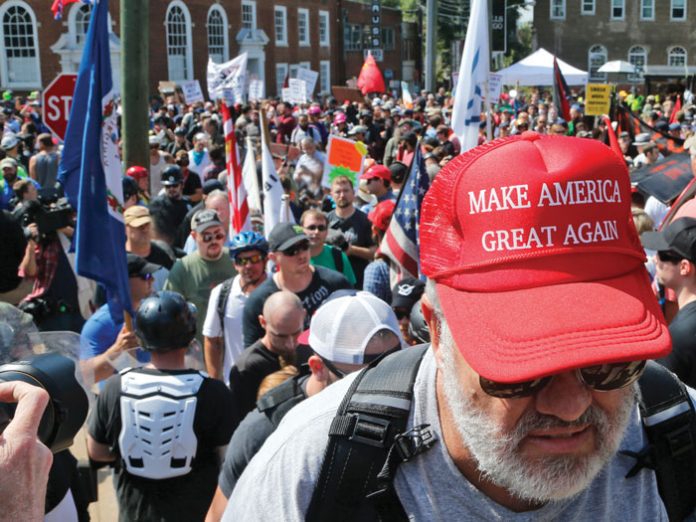The controversy over the canceled tour of Israel by Congresswomen Rashid Tlaib and Ilhan Omar rebounded into a bitter argument about statements by President Trump, with some Jewish organizations and pundits decrying his words as anti-Semitic.
In an interview in the Oval Office on Tuesday of last week, President Trump pushed back at the suggestion by Omar that funding to Israel should be cut off until they change their approach to the Palestinians.
“Five years ago, the concept of even talking about this—even three years ago—of cutting off aid to Israel because of two people that hate Israel and hate Jewish people—I can’t believe we’re even having this conversation,” Trump said. “Where has the Democratic Party gone? Where have they gone where they’re defending these two people over the State of Israel?”
He added, in the comment that got the most airplay, “I think any Jewish people that vote for a Democrat—it shows either a total lack of knowledge or great disloyalty.”
That night and into the next morning, pundits and the public argued about what Trump had meant by disloyalty. Did he mean disloyalty to Israel? Disloyalty to the Jewish people?
But as he spoke to the press the next day, Trump put both interpretations into the mix. “In my opinion, you vote for a Democrat, you’re being very disloyal to Jewish people, and you’re being very disloyal to Israel,” he said, “and only weak people would say anything other than that.”
The idea that Jews need to be “loyal” to Israel, or that they generally are, was denounced by Jewish organizations as playing into an anti-Semitic trope. Anti-Defamation League CEO Jonathan Greenblatt tweeted in response: “@POTUS made it clear he thinks Jews have a dual loyalty to Israel. This #antiSemitic trope has been used to persecute Jews for centuries & it’s unacceptable to promote it. He should apologize immediately.”
Halie Soifer, executive director of the Jewish Democratic Council of America, commented: “If this is about Israel, then Trump is repeating a dual loyalty claim, which is a form of anti-Semitism. If this is about Jews being ‘loyal’ to him, then Trump needs a reality check. We live in a democracy, and Jewish support for the Republican Party has been halved in the past four years.”
The suggestion that Jews are generally loyal to Israel has been a particular problem for Jews trying to serve in US government positions that are security-sensitive, especially since Jonathan Pollard was convicted on charges of spying for Israel while serving as a US Navy analyst. Jews have complained of being denied job offers or promotions in manners that suggested that they were being suspected of dual loyalty, meaning to Israel as well as the US.
President Trump, for his part, has often said things that suggest he believes that all American Jews should see Israel as their “country.” At a speech in April to the Republican Jewish Coalition, a Jewish American group, he referred to Israeli Prime Minister Benjamin Netanyahu as “your prime minister.”
Critics of President Trump have suggested that his view of American Jews is part of a worldview that sees ethnicity as an essential part of nationalism, one in which only white Americans are “true Americans.”
Because about 70 to 80 percent of Jews in the US vote Democratic, the charge that they are either uniformed or disloyal was bound to ruffle feathers. But not everyone was bothered. And the arguments go to a more basic question: Is President Trump good for the Jews?
To make clear the sides of the debate, Ami spoke with representatives of the Republican Jewish Coalition and the Democratic Majority for Israel about their opposing views on the president’s statements.





















